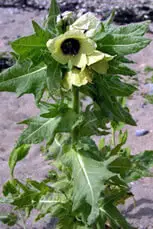The agent of ruin or woe.
The bane of one’s life
What's the meaning of the phrase 'The bane of one's life'?
What's the origin of the phrase 'The bane of one's life'?
We don’t often use the word ‘bane’ any longer and when we do it is likely to be as part of ‘the bane of my/his/her life’. This is usually uttered as a complaint against a not very serious threat, for example, a gardener might complain “those slugs are the bane of my life”. Baneful threats weren’t always so casual. ‘Bane’ is a very ancient word, recorded in the Old English Chronicles as early as circa 800, meaning ‘murderer’. The bane of one’s life in those days was a very real threat to one’s existence.
Over time, the term ‘bane’ came to mean ‘that which causes death’ and specifically, poison. This is still with us in the names of various poisonous plants, for example Henbane (Hyoscyamus niger), Wolfsbane (Aconitum) and the unpleasant sounding Ratsbane, which is another name for rat poison that is, arsenic.
The earliest recorded use that I can find of ‘the bane of someone’s life’ comes from a date at which we can assume he really meant it – Gabriel Harvey’s Foure Letters and certaine Sonnets, 1592:
“He that like a Lacedemonian, or Romane, accounteth Infamy worse than death, would be loath to emprove his courage, or to employ his patience, in digestinge the pestilent bane of his life.”
Related phrases and meanings
Browse more Phrases
About the Author

Phrases & Meanings
A-Z
A B C D E F G H I J K L M N O P Q R S T UV W XYZ
Categories
American Animals Australian Bible Body Colour Conflict Death Devil Dogs Emotions Euphemism Family Fashion Food French Horses ‘Jack’ Luck Money Military Music Names Nature Nautical Numbers Politics Religion Shakespeare Stupidity Entertainment Weather Women Work
How did we do?
Have you spotted something that needs updated on this page? We review all feedback we receive to ensure that we provide the most accurate and up to date information on phrases.
